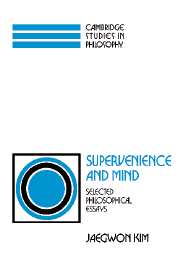Book contents
- Frontmatter
- Contents
- Preface
- Sources
- Part I Events and supervenience
- Part II Mind and mental causation
- 10 Psychophysical supervenience
- 11 Psychophysical laws
- 12 What is “naturalized epistemology”?
- 13 Mechanism, purpose, and explanatory exclusion
- 14 The myth of nonreductive materialism
- 15 Dretske on how reasons explain behavior
- 16 Multiple realization and the metaphysics of reduction
- 17 The nonreductivist's troubles with mental causation
- 18 Postscripts on mental causation
- Index
17 - The nonreductivist's troubles with mental causation
Published online by Cambridge University Press: 28 January 2010
- Frontmatter
- Contents
- Preface
- Sources
- Part I Events and supervenience
- Part II Mind and mental causation
- 10 Psychophysical supervenience
- 11 Psychophysical laws
- 12 What is “naturalized epistemology”?
- 13 Mechanism, purpose, and explanatory exclusion
- 14 The myth of nonreductive materialism
- 15 Dretske on how reasons explain behavior
- 16 Multiple realization and the metaphysics of reduction
- 17 The nonreductivist's troubles with mental causation
- 18 Postscripts on mental causation
- Index
Summary
A BIFURCATED WORLD OR A LAYERED ONE?
Mind-body dualism in the classic Cartesian style envisages two nonoverlapping domains of particulars (“substances”) that are, by and large, equal in ontological standing. Mental items are thought to share a certain defining property (“thinking” or “consciousness,” according to Descartes) that excludes the defining property shared by the items on the physical side (“extension,” according to Descartes). And associated with each domain is a distinct family of properties, mental properties for one and physical properties for the other, in terms of which the particulars within that domain can be exhaustively characterized. We are thus presented with a bifurcated picture of reality: the world consists of two metaphysically independent spheres existing side by side.
But not everyone who accepts a picture like this thinks that the two domains are entirely unrelated; although there are notable exceptions, such as Leibniz and Malebranche, many substantival dualists, including of course Descartes, have held that, in spite of their separateness and independence, the domains are causally connected: mental events can be, and sometimes are, causes and effects of physical events, and changes in a mind can be causes or effects of changes in a body. This means that events of both kinds can occur as links in the same causal chain: if you pick a physical event and trace its causal ancestry or posterity, you may run into mental events, and similarly if you start off with a mental event.
- Type
- Chapter
- Information
- Supervenience and MindSelected Philosophical Essays, pp. 336 - 357Publisher: Cambridge University PressPrint publication year: 1993
- 34
- Cited by



